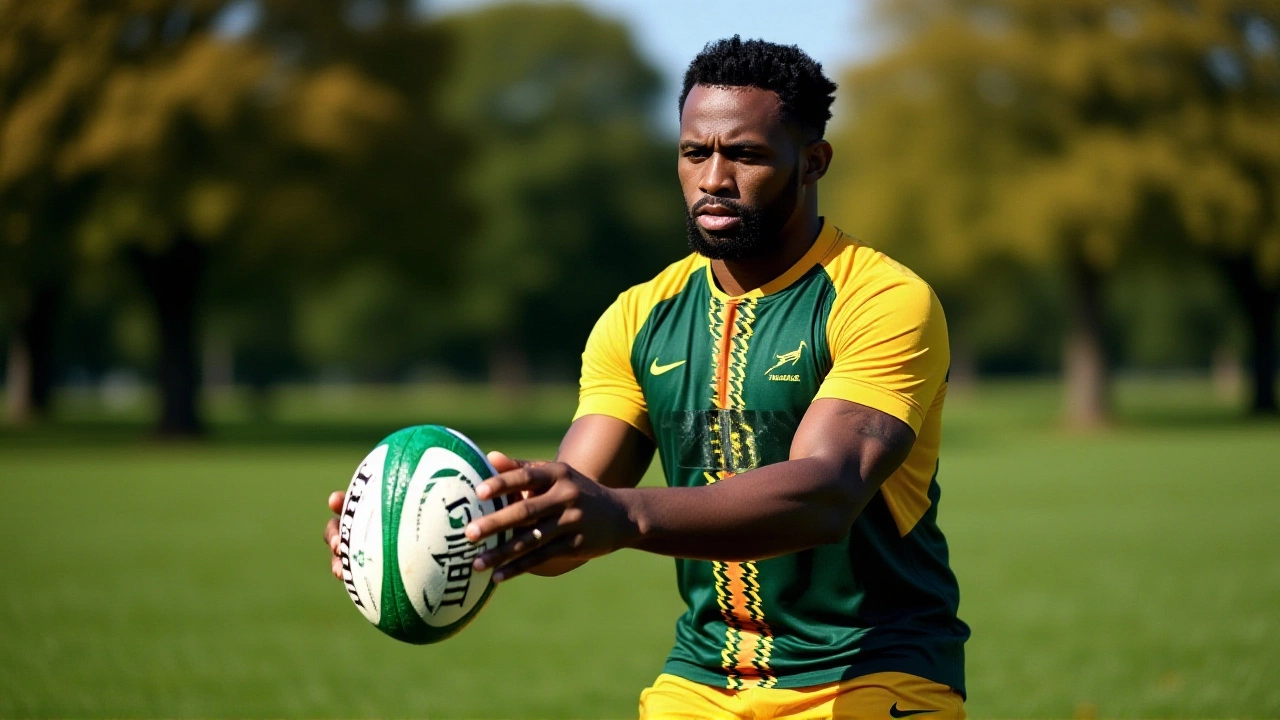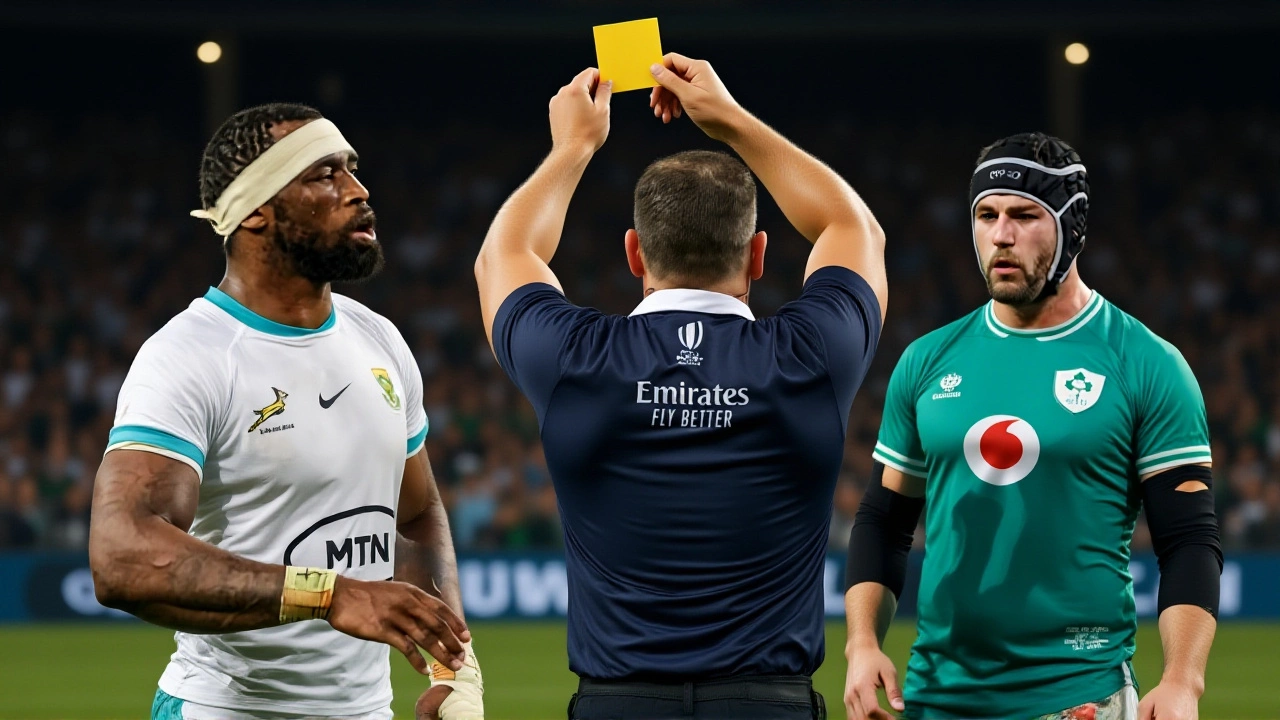South Africa pulled off a stunning 24-13 victory over Ireland in a rain-slicked, card-filled thriller at Aviva Stadium on Saturday, November 22, 2025 — a match that will be remembered not for its brilliance, but for its madness. With referee Matthew Carley handing out an unprecedented five disciplinary cards to Ireland, including a 20-minute red to lock James Ryan, the home side spent nearly 25 minutes playing with fewer than 15 men. Yet somehow, they nearly pulled off the impossible. The Springboks, under first-time Dublin-winning coach Rassie Erasmus, seized control early and never let go — even when Ireland, down to 12 men, refused to quit.
The Disciplinary Avalanche
It started before the 5-minute mark. Ireland’s fly-half Jack Crowley, on as a HIA replacement for Tadhg O'Brien, was sin-binned for a cynical ruck infringement. Then came Andrew Porter — the veteran prop, Ireland’s rock — for a scrum penalty just two minutes later. By the 19th minute, James Ryan was sent off for a dangerous cleanout on Malcolm Marx, the Springboks’ hooker. The crowd fell silent. Ireland, suddenly down to 12, had no time to breathe.
Referee Carley’s whistle became a constant presence. Four yellow cards. One red. Five players suspended. The match clock ticked past two hours. RugbyPass analysts later noted it was the most cards ever issued in a single Test between these two sides — and among the highest in modern international rugby history.
Springboks Capitalize, Ireland Resists
South Africa didn’t need to score wildly to win. They just needed to grind. After Damian Willemse scored a spectacular "superman" try in the third minute, the Springboks turned to the scrum — not to score, but to suffocate. "It wasn’t about points," said one anonymous Springbok forward post-match. "It was about making them tired. Making them angry. Making them break."
It worked. Ireland’s discipline cracked under the pressure. Center Paddy McCarthy followed with a second-half yellow, leaving Ireland with 12 men again. But here’s the twist: Ireland didn’t fold. They dug in. Jack Crowley made two last-ditch tackles inside his own 22. Fly-half Sam Prendergast, who’d already been replaced, watched from the bench as his replacements kept the line alive. When Aphelele Feinburg-Mngomezulu crossed for his second try in two Tests — a blistering 40-meter run off a turnover — it felt like the game was over. But Ireland still had fight.

A Coach’s Perspective: "Mad. Chaotic. Remarkable."
"It was mad," said Andy Farrell, Ireland’s head coach, his voice hoarse after the final whistle. "The way the lads responded when down to 12 men, especially in the first 10 minutes of the second half, was truly remarkable. We won the scoring 6-5 in that period. That’s not luck. That’s character."
Farrell’s stats were accurate. While South Africa led 19-7 at halftime, Ireland scored six points in the second half — two penalties from Sam Prendergast — to South Africa’s five. They outplayed the world champions in territory, in possession, in sheer will. But they were playing with too few bodies. And the Springboks, under Erasmus, had mastered the art of controlling chaos.
Ending the Streak — But at What Cost?
This was more than a win. It was a statement. Ireland had beaten South Africa in each of their last three meetings — in 2022, 2023, and 2024. They’d built a reputation as the team that could outthink, outmaneuver, and outmuscle the Springboks. But on this night, in Dublin, the script flipped. Erasmus, who’d lost his previous four matches against Ireland, finally got his breakthrough — and it came not through superior skill, but through superior control of the game’s most volatile element: discipline.
"It’s not how we wanted to win," admitted Damian de Allende, who broke the Irish line to set up Willemse’s try. "But when the ref’s blowing like that, you have to adapt. You can’t afford to think about fairness. You think about winning."
For Ireland, the cost was steep. Four players suspended. A bruised morale. And questions about the consistency of refereeing — especially with Matthew Carley’s decisions drawing immediate scrutiny from broadcasters and former players alike. RTE Sport’s Michael Glennon reported that the Springboks deliberately targeted scrums "not to score, but to demoralise," and that the repeated scrum resets wore down Ireland’s forwards — physically and mentally.

What’s Next? World Cup Shadow Looms
The Rugby World Cup is less than a year away. Both teams now carry heavy baggage into it. For South Africa, this win proves they can win ugly — a vital trait in knockout rugby. But the match also exposed a troubling trend: the Springboks’ reliance on physical intimidation, and whether that’s sustainable under World Cup scrutiny.
For Ireland, the challenge is clearer: how do you rebuild discipline under pressure? How do you protect your key players from the referee’s whistle? And can they recover mentally before facing New Zealand in June? Farrell says yes. "We’ve got fight. We’ve got talent. We’ve got time."
But time is running out. And next time, there may not be a red card to blame.
Frequently Asked Questions
How many players were sent off or sin-binned in the match, and who were they?
Ireland had five disciplinary incidents: James Ryan received a 20-minute red card for a dangerous cleanout on Malcolm Marx at 19 minutes. Four others were sin-binned: fly-half Jack Crowley (cynical ruck), prop Andrew Porter (scrums), center Paddy McCarthy (second-half tackle), and Tadhg O'Brien (replaced due to HIA — though not carded, his substitution triggered the chain). South Africa’s Grant Williams received a late yellow card, briefly giving Ireland a numerical advantage.
Why was this match so significant for Rassie Erasmus and South Africa?
This was Rassie Erasmus’s first-ever win over Ireland in Dublin as Springboks head coach. Ireland had defeated South Africa in each of their last three meetings — including two in 2023 and 2024 — making this a psychological breakthrough. Erasmus’s strategy of controlling the game through scrum dominance and disciplined pressure, rather than flashy attack, proved decisive under extreme conditions.
Did Ireland actually outplay South Africa in the second half?
According to Irish head coach Andy Farrell, Ireland "won" the second half 6-5 in scoring, despite playing most of it with 13 or 12 men. They dominated territory, forced turnovers, and held firm under relentless pressure. But South Africa’s superior structure and Ireland’s lack of bodies made it impossible to convert dominance into points — a testament to how discipline can dictate outcomes even when effort is equal.
What role did the scrum play in Ireland’s disciplinary issues?
According to RTE Sport’s Michael Glennon, the Springboks used scrums not just for gain, but as psychological tools. Repeated scrum resets, slow feed delays, and physical pressure wore down Ireland’s forwards, leading to rushed decisions, illegal holds, and penalties — which directly triggered the yellow cards. The tactic was less about scoring and more about breaking morale.
How does this result affect Ireland’s World Cup chances?
Ireland’s discipline under pressure is now a major concern. With key players like James Ryan and Andrew Porter facing suspension and scrutiny, their forward pack’s reliability is in question. While their resilience was admirable, the frequency of penalties and red cards could be fatal in a knockout tournament. Coaches will need to retrain players on high-pressure decision-making — or risk elimination by a more composed side.
Was the refereeing consistent, or did it favor South Africa?
There’s no evidence the referee favored one side, but the consistency was questionable. Ireland received five disciplinary cards; South Africa received one. Yet South Africa’s scrum infringements — which triggered much of the chaos — were often overlooked. Experts like former referee Chris Pollock noted that Carley applied the laws correctly but failed to manage the game’s emotional temperature, allowing tensions to escalate into repeated breakdowns.
